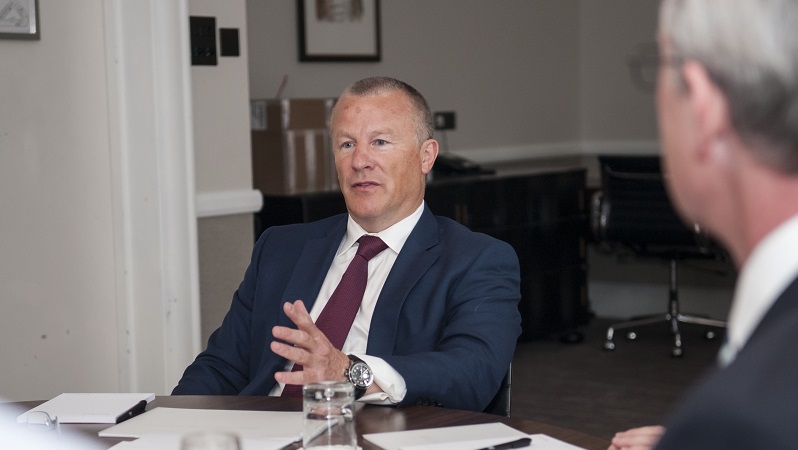Beleaguered investors in Neil Woodford’s former fund have been given more difficult news to stomach, as one of the fund’s last remaining biotech holdings collapses into administration.
Rutherford Health announced on Monday it would be winding down operations, after attempts to resuscitate the business fell short.
Launched in 2015 as Proton Partners, the Hereford-based company owns and operates private oncology centres across the UK, specialising in advanced cancer treatments, including high energy proton beam therapy, diagnostic imaging, radiotherapy and chemotherapy.
Woodford was one of the private company’s biggest backers, owning around 42% of its total issued share capital across his open-ended Woodford Equity Income fund and Patient Capital Trust, months before his funds empire imploded.
While manager on the funds, Woodford committed millions of pounds worth of financing to keep the cash-strapped business afloat.
During the pandemic, Rutherford continued to hit investors up for cash to support its expansion plans, which saw it open a £20m diagnostics HQ in Liverpool.
However, chief restructuring officer and interim CEO Sean Sullivan said hefty infrastructure costs and a “critical lack of patient volume” due to Covid-19 had created “extremely challenging trading conditions”, leaving the directors with no choice but to liquidate the business.
Rutherford represents 17% of LF Equity Income NAV
Rutherford’s collapse is yet another bitter pill to swallow for investors trapped in Woodford’s fund, now called LF Equity Income.
It is one of nine holdings Link Fund Solutions, the fund’s authorised corporate director, has been struggling to sell since it began winding the fund down in October 2019.
Total assets in LF Equity Income were valued at £142.5m as of 31 May. Rutherford accounted for 17.14% of NAV, meaning investors stand to lose £24m if the holding is written down to nil.
Schroder UK Public Private, formerly Woodford Patient Capital Trust, is set to take a 6.5% hit to NAV from the write-off of its £22.8m stake in Rutherford.
AJ Bell head of investment research Ryan Hughes said, even though Rutherford’s problems were well-publicised, this will represent “another kick in the teeth for investors who have waited patiently for 18 months since the last distribution and have seen no progress in the sale of the remaining assets”.
“Given Link has announced the fund is moving to quarterly valuations at the end of the month and indicated that the sale process could run into 2023, I suspect investors have very low expectations as to when this sorry saga will finally come to an end,” he added.
See also: FCA silence adds insult to injury as Woodford scandal hits three-year mark
Link ‘extremely disappointed’ by Rutherford outcome
Link has come under fire for its handling of the LF Equity Income wind-up, including its decision to sell £224m of biotech holdings to Acacia Research, some of which were quickly sold for huge profits.
According to The Times, it had an opportunity to divest its stake in Rutherford last year. Mahdi Alfardan, chairman of the Gulf International Cancer Centre in Abu Dhabi, reportedly flew to London in September and offered Link 65p per share for its 20.3% stake in Rutherford.
A spokesperson for Link told Portfolio Adviser the ACD was “extremely disappointed” by the recent events at Rutherford Health.
“We have worked hard alongside other shareholders in the company to support the new Rutherford management team to improve the financial situation at the company, but it has become clear that today’s news was unavoidable.”
Link and SUPP were among several key shareholders to provide a small amount of bridging finance over recent months to keep the company on life support as it explored longer term funding options.
Though a significant number of parties were approached, and “substantive discussions” took place with one third party, an eleventh hour deal was not reached, leaving Rutherford empty handed, according to Link.
“We will do everything we can to support the administrators in an attempt to recoup as much value as possible for shareholders and will update them as soon as we are able,” the spokesperson added.
Rutherford pursued ‘flawed expansion strategy’
SUPP managers Tim Creed and Roger Doig said it is “uncertain” the liquidation process will result in proceeds for the investment trust.
Creed and Doig said they had spent a “significant amount of time” working with Rutherford to improve its financial situation and operational performance, but the “flawed expansion strategy” pursued by the company in its initial years “laid the ground for an ultimately unsustainable funding need”.
“Over £240m was spent in developing four oncology therapy centres with a significant amount of the capital expenditure spent on the site requirements and the equipment required to offer proton beam therapy.
“While there is rising evidence that proton therapy is a better clinical option for many patients, it remains a service which still has very limited reimbursement in the UK. Building and operating four centres led to a high and unsustainable cash burn which ultimately resulted in [Monday’s] announcement as Rutherford has been unable to attract sufficient new funding to continue trading.”
Rutherford had been hailed by SUPP as one of the winners benefitting from the Covid crisis. However, for two years it was one of the £364.9m trust’s worst performers after suffering steep write downs. At the end of December 2021, it represented 4.8% of total assets, down from 8% a year prior.
See also: Schroders trust warns former Woodford holdings it will not be an ‘endless source of capital’
“Despite the failure of Rutherford, we are positive on the outlook of Schroder UK Public Private Trust,” they continued.
“Challenges have been resolved and many successful exits realised. The company has made a number of new private and public investments and we remain highly confident in the portfolio’s potential to generate long-term shareholder value.”










